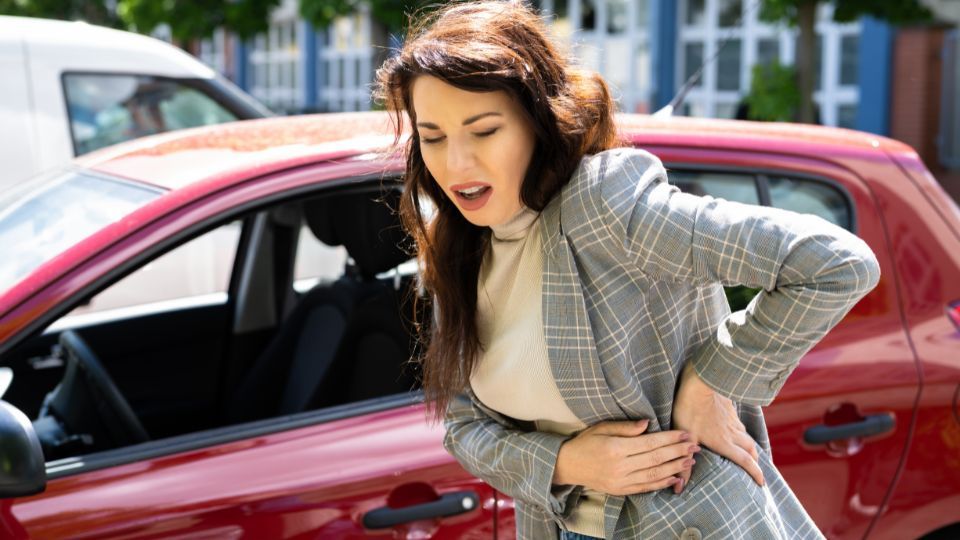
Why You Have Hip Pain From Driving & Hip Pain After Driving
If you’ve ever had hip pain while driving, then you know that it’s one of the most uncomfortable experiences around. You’re stuck in a vehicle with nowhere to go, and all you want to do is enjoy your journey.
However, your body might feel stiff, your hip may be cramping up, and you may even feel numbness or pain in your other extremities despite your best wishes.
So in this article, let’s talk about how to eliminate hip pain from driving as well as what the cause is. That way, you can enjoy longer journeys with more comfort.
And keep in mind, if you’re having any kind of discomfort, the specialists for hip pain in Baltimore can help you diagnose your issue and find the right treatment.
The Cause Of Hip Pain After Driving Long Distances
Most Americans drive fairly frequently. And for many people, taking road trips to visit family or even spending time in rush hour and long commutes is a normal part of their routine.
That adds up to a lot of time simply sitting in your car. While this may feel almost relaxing or even passive, it’s actually causing stress in your muscles. Sitting in your car is actually not a great posture when it comes to your lower back, neck, hips, or feet.
And ultimately, your hip flexors are one of the most affected areas when driving. This helps explain why so many people have hip pain while sitting in cars.
How Cars Put Stress On Your Hips
When you’re in a seated position, muscles called the iliacus muscle and psoas contract. These muscles are designed to stabilize your spine and pelvis area. Therefore, sitting for an elongated period of time can cause these muscles to freeze.
After this happens, inflammation and knots in your muscles occur. It’s not the same as simply sitting in a chair. When you’re driving a car, you’re moving different parts of your body, like your driving leg, and this contracts those muscles even more.
This is especially true if you have a manual transmission vehicle. So since your hip flexors are trying to hold you upright and your other muscles are engaging, you’re constantly contracting them and causing stress.
Hip Symptoms To Be Aware Of
The additional tension eventually leads to fatigued muscles, sore joints, and overall hip pain.
Your symptoms may even be worse, however. And it’s important to know if they indicate a hip injury. For instance, pain in the right leg and hip while driving could be a sign of a chronic condition like sciatica or worse. So consulting specialists should always be your first course of action.
That being said, let’s talk about some ways that you can reduce this hip pain when driving in the future.
How To Reduce Hip Pain While Driving
It may be difficult to take frequent breaks from sitting when you’re driving. Compared to sitting in an office chair, there’s a lot more involved than simply stopping your car.
So let’s talk about some different things you can do. First of all, try not to slouch, but aim to keep your shoulders back and relaxed instead of leaning forward. Adjust your controls to slightly angle the seat back.
You want your knees to be around 90 degrees. Your feet should be able to rest comfortably on the floor. Avoid overreaching to the pedals with your legs. Your legs should be able to easily reach it without strain.
This helps reduce hip flexor stress and, ultimately, hip pain. Additionally, before you embark on your journey, try to stretch your iliopsoas muscles.
Doing some hip circles or a hip flexor stretch for about a minute beforehand is enough to start making that area more relaxed.
Don’t Take Hip Pain From Driving Lightly
Driving can certainly cause hip pain to your hip flexors, muscles tightening, and other discomfort. However, it could also be a sign of a worse condition.
You may have other health problems that are causing your hip pain. If this is the case, the best thing you can do is see a hip specialist. They can diagnose the core cause of your hip pain. Whether a non-invasive therapy or surgery is necessary, they’ll let you know as soon as possible.
See A Hip Pain Specialist In Baltimore Today
You don’t have to suffer from hip pain that restricts your life. Luckily, experts at the Ascension St. Agnes Orthopedic and Spine Institute can offer you solutions for your hip pain.
This includes hip replacements, diagnostic arthroscopy, resurfacing, and more. Reach out to our office today and schedule an appointment to learn about your options.